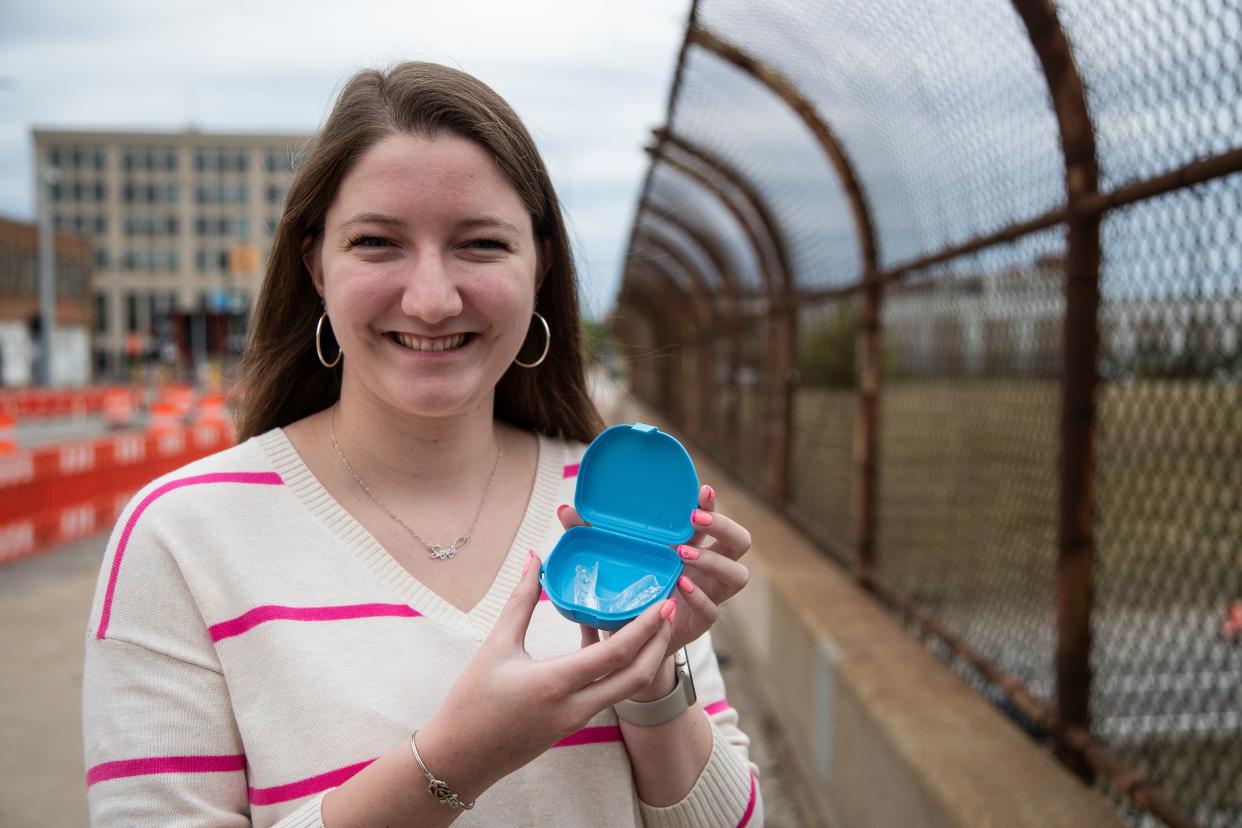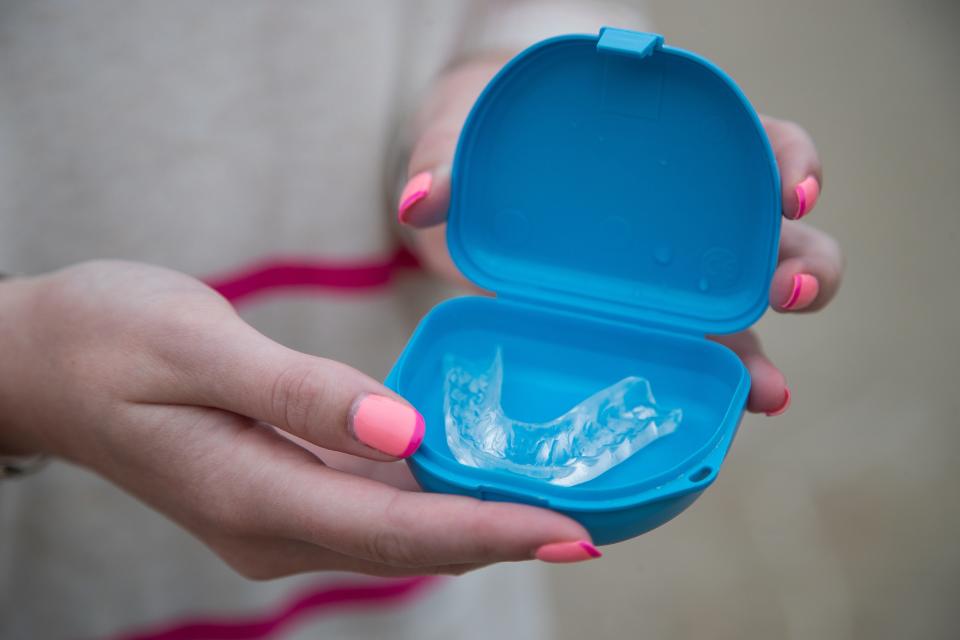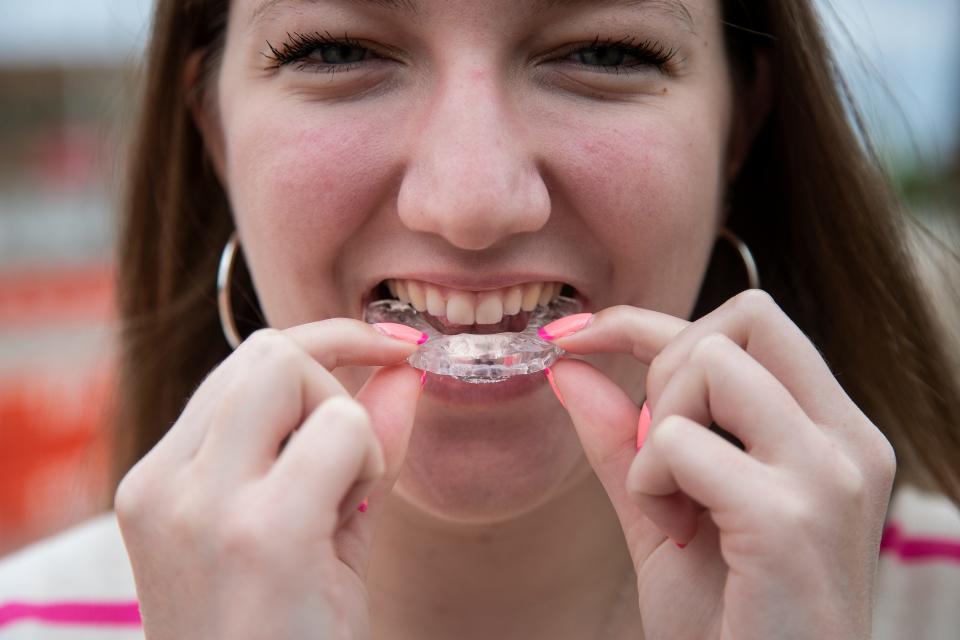Teeth grinding, sore jaws surge as likely side effect of COVID-19 stress: What you can do

Sarah Stovall, a junior at Albion College and a Grosse Pointe native, knows all about stress, from juggling college, exams and her job.
She carries that stress in her teeth.
Stovall is one of a growing number of people at risk of cracked teeth, headaches and a sore mouth because of bruxism — she grinds, grits or clenches her teeth, usually while sleeping. Instead of waking up rested, she wakes up with a sore jaw.
Dentists say they have seen a rise in teeth grinding issues since the onset of COVID-19, although there is no research yet tying the increase to stress from the pandemic.
"Before COVID, it was a lot due to decay, neglect and just bad teeth," said Dr. Vince Benivegna, an oral surgeon who is a partner with Mid Michigan Oral Surgery, with offices in Charlotte and Grand Ledge and headquarter in East Lansing. "But I'm taking out it seems like a lot more teeth that look perfectly healthy. They don't have a big filling, they don't have a crown, virgin teeth and now they're cracked. And so, this has been talked about quite a bit in the dental world."
Stovall wears a night guard to bed that typically had to be specially ordered at the dentist costing $500 or more.
Now, with new technology, the internet and companies wanting to provide cheaper options for night guards, patients are saving money — and their teeth — by turning to do-it-yourself dental technology to create everything from inexpensive mouth guards and even dentures.
Bruxism, more commonly known as teeth grinding, is the act of clenching, grinding or gnashing while you're sleeping or awake. It can cause headaches, a sore mouth, and sleeping disorders for some, according to the Mayo Clinic.
Teeth grinding can cause headaches, a sore mouth and sleeping disorders for some, according to the Mayo Clinic.
Stovall discovered she was grinding her teeth when was in the eighth grade, but since her teeth were still young and shifting due to growth, she couldn't get fitted for a night guard.
Now at 20, she's still struggling with teeth grinding and believes the COVID-19 pandemic made it even worse because of stress.
"My grinding is directly linked to my stress personally," Stovall said.
If big tests or other stressors are happening in Stovall's life, she typically finds herself trying to stop grinding.
"I will put my bite guard on at night and then I'll wake up and I can tell that I've grinded some of that guard or plastic off and my jaw will be sore," she said.
If the grinding and clenching only happened at night, it would be easier for her, but it doesn't. She actually experiences the same symptoms during the day, especially if she's trying to complete tasks or focus. It's a chain reaction, the clenching and grinding start to feed off each other.

"I will notice that my jaw will get tight and clench," she said. "I'll start rubbing my teeth back and forth, doing the grinding motion. "I always have to kind of think to myself, 'OK, you're starting to grind and clench your teeth, relax your jaw,' or (I'll) go and get my bite guard and put it in."
An escalating problem
Stovall isn't the only one. Dentists across the country are seeing an increase in teeth grinding, particularly those being linked to stress and depression. Companies are doing something about it.
In recent patient visits, Dr. Benivegna says roughly 20% to 30% of his patients are checking off anxiety and depression as past medical history, which raises concern regarding the health of their teeth.
Benivegna works in multiple offices with Mid Michigan Oral Surgery. He has says right now, there's not enough data to guarantee scientifically that COVID-19 caused more stress that led to individuals cracking their teeth.
"People are still looking at the data and maybe writing articles and submitting them to journals and things and they're not out yet," he said. "But anecdotally, I can tell you that all my dental friends, everybody that I talked to when I go to meetings and such, they're all saying that you know more and more of their patients are coming in with cracked teeth, grinding and clenching their teeth."
There are traditional ways to avoid damage to teeth by either getting night splints, bite guards or some type of night guard. Benivegna says, however, that there is no set cure for bruxism.
"We haven't found anything to date to help people to stop grinding," he said. "There's no magic bullet, there's no pill that we can give them, nothing. No medication that we can give them to help stop grinding their teeth at night."
Ways individual can treat their bruxism
Professional dentists suggest coming into your local dentist's office to get diagnosed with bruxism.
While there is no cure, mouth guards are the best equipment to prevent teeth from cracking at night because of grinding.
Stovall says her dentist suggests relaxation techniques to relieve stress.

"I am definitely tired of grinding my teeth, I definitely wish it was something that I could just turn off," she said.
Companies like SportingSmiles, an online store specializing in do-it-yourself bite guards, allow individuals to order a kit online, where they can make an impression of their teeth and then send it back for custom orthodontic products.
"We're not trying to like cut out dentists, we're trying to help with other options as kind of replacements of guards," said SportingSmiles CEO and Founder Evan McCarthy.
The company originated in 2009 in Brookfield, Wisconsin. Its goal is to provide a range of high-quality dental products that individuals can buy that don't cost a lot of money. This allows customers to eliminate the "middleman" by ordering the kits and doing the impressions themselves.
McCarthy and his father are the actual masterminds behind the company after one game of baseball knocked out a couple of McCarthy's teeth. Plus a couple of thousand dollars later, McCarthy's father, who is also a dentist, began experimenting with making mouth guards so that his son could continue to play sports.
"From there, we had other teammates that are interested in it, so we made them for them," he said. "Later on in life, I kind of turned it into what nowadays they call it a side hustle of making some mouth guards and selling them online to certain people. I just really felt a huge need for them."
SportingSmiles custom teeth guards and retainers ranging from $90 to $135. It also has a wide range of mouth guards for just about any sport. It also sells teeth whitening kits starting at $80.
"Our business model is more lower price and we make higher amounts of product," he said.
On average, the company can make thousands of products weekly. As customers' teeth may shift or change, the company keeps a digital file of the customer's teeth mold using a 3D scanner to save time and money for the customer.
Other online teeth grinding supply websites
Cheeky: Customers take their own impressions, send it back to the company and then it creates a custom mouth guard. A yearly and one-time package is available for purchase. The yearly subscription is $54.75 for each night guard, you purchase. Every three months, you receive a new night guard at no cost, it totals out to be an upfront payment of $219. The one-time night guard is $139. The online reviews are quite good and many customers were happy about being able to purchase night guards online.
Pro Teeth Guard: Another company where customers are mailed their kits and have to take their own impressions. The company will receive the impressions back and create the customer's custom night guard. Pro Teeth Guard offers free shipping for customers in the U.S. and Canada. It also offers different types of night guards ranging from heavy that start at $209.99 to soft versions that start at $169.99. Online reviews say the company's night guards are comfortable.
There is even an online market for dentures or veneers as well.
Pop On Veneers : Customers fill out a questionnaire to find out whether they are a candidate first. The questionnaire asks whether you are // missing five or more teeth on the top or bottom row. Top and bottom veneers start at $649 but the company is offering $100 off with a promo code. The price for top or bottom is $499 not including the $100 off promo code. Payment options like Klarna and Affirm are available for customers as well. Many reviews say they are good but do take some time to get used to.
This article originally appeared on Detroit Free Press: Teeth grinding becomes more common amid COVID-19: Treatment, symptoms

